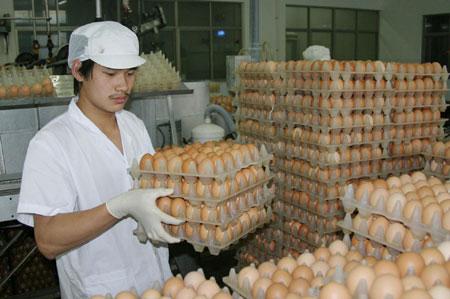
A man works at rural egg processing factory in Hui'an, Jiangsu province. [XU RUIPING / FOR CHINA DAILY]
BEIJING - Local enterprises in rural areas, though usually new and small compared with those in more advanced coastal areas, are a major attraction to migrant workers moving back to their hometowns.Due to factors including the protracted global recession and inaccessible urban welfare systems, some migrant workers employed in coastal factories are returning to their native regions.
Those people tend to stay in the local area, either to run their own businesses or find jobs with local companies, Peng Zhenhuai, a professor from the local government research institute under Peking University, told China Daily.
In a survey cited by Peng, two-thirds of the returned migrant workers chose to start up businesses in their county towns or other small towns. These business startups will play an important role in further narrowing China's urban-rural gap by generating more off-farm jobs, and by turning local specialties into commercial products.
Townships with more advanced public infrastructure and social services can better accommodate returned migrant workers. They are also their first choice when they move back to their native region.
It would be a healthy trend, the professor said, if more townships could follow the example of Guangdong province, where 274 of its 1,551 counties have reportedly been able to generate at least 1 billion yuan in annual gross domestic product (GDP) by building a specialized and unique value chain for local industries.
Peng mentioned the towns of Rongyi and Xiaolan, both in the Pearl River Delta of Guangdong, as two classic cases of the cluster effect of same-industry enterprises. While Rongyi has become a famous town for home electrical appliances, Xiaolan has become noted for metal ware and small tools.
Today, in interior regions, the coastal phenomenon of enterprise clusters is being emulated.
In Peng's study, in Longshui, a town in Chongqing municipality, local metal-ware enterprises have formed the largest cluster in the metal industry in southwestern China, generating around 50,000 jobs and 1.2 billion yuan in sales in 2009.





